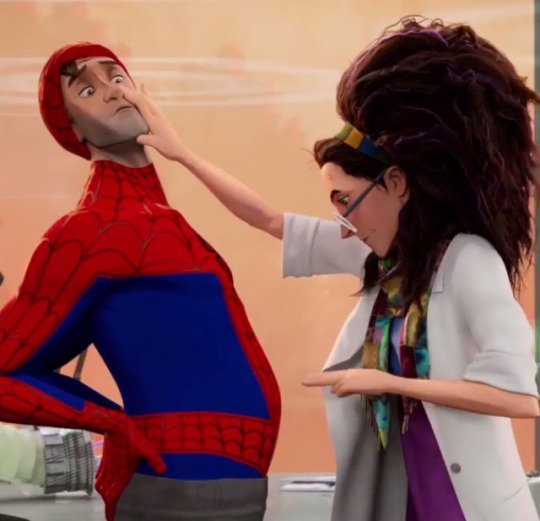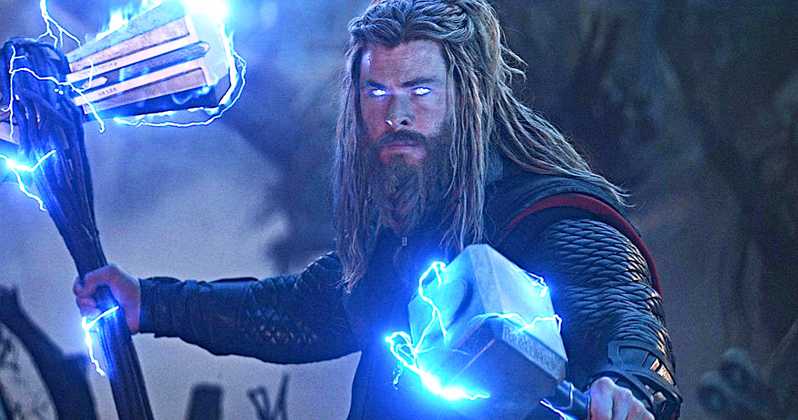Over the past week there’s been quite a few articles about the problems inherent to Thor’s new body shape in Avengers: Endgame, and before I get into my complicated feelings about what that means for me, as a fat person, I want to take a moment to affirm my agreement with the critics who have called out the narrative for the comedic treatment of fatness, and also pointed out the issues with having Chris Hemsworth in a fat suit. Fatness in narrative, whether it be comedic or tragic, as shorthand for depression, as shorthand for failure, is fatphobic.
I’ve been fat my entire life and I’m extremely familiar with what it’s like to be the subject of fat jokes, staring, and having people (including doctors) helpfully suggest new diets or nutritionists. I struggle with not just body image but living in the world as a fat person when everything in it, from clothing, to cars, to chairs, are not designed for my body. I physically felt this in Endgame because the movie theatre I saw Endgame in had extremely narrow chairs which meant my shoulders and arms were pressed against the person on my left—who was also, like me, larger than the chair designers think people should be.
Despite my best efforts, I had been spoiled to Thor’s fatness and how he was the subject of fatphobic jokes. In some ways, knowing going in, I was emotionally prepared for how to feel. And in the theatre, the people around me guffawed and laughed every time he was on the screen. That’s not unusual, really, on screen or in real life. I see that fatphobic humor directed at myself and other people on a daily basis.
I have no way of knowing whether the move to make Thor fat was anything other than comedic in intent, and the writers have been interviewed making a number of assertions about the characters that frankly leave me wondering if they watched the other movies at all. And considering this movie spends multiple jokes talking about Chris Evans’ ass, the fact that Thor no longer has a washboard stomach is worth thinking about.
For me, Thor’s relationship to his fatness, in the context of how others view his fatness (narratively, and critically, meta-narratively), is not only relateable because of the fatphobia inherent in its use as a joke, but body positive because of the way it’s unaddressed by Thor as such.
But there’s more to Thor’s fatness—and the reactions to it—I’m struggling with. Putting aside it’s implied Thor is fat because he’s depressed, I struggle with that leading to the conclusion that because the fatness was a narratively lazy decision, it’s unacceptable to like Thor being fat. For me, Thor’s relationship to his fatness, in the context of how others view his fatness (narratively, and critically, meta-narratively), is not only relateable because of the fatphobia inherent in its use as a joke, but body positive because of the way it’s unaddressed by Thor as such.
And that brings me to this central idea I’ve been wrestling with—does the comedic intent behind Thor’s fatness mean we can’t view Thor in a positive light?
Because I love Thor in this movie.
I love him because while the audience laughed at him, while the characters laughed at him, while his mother told him to go eat a salad as a punchline, Thor himself never seemed to pay any attention to the fatphobia directed at him. And as the narrative progressed and Thor’s character arc to become a hero became clear, I waited for the inevitable moment in Thor’s story when he would magically lose the beer belly–thereby implying not only that fat heroes are failures, but that Thor’s fatness had been his own self-punishment he easily, voluntarily, could undo once he felt he could be a hero again—pretty much the standard narrative for any fat person in every media. But that didn’t happen.
There’s a handful—literally I could probably count them on one hand—of media properties out there where the fat character’s journey doesn’t culminate in losing weight. Valiant’s Faith made headlines not just because she’s a fat superhero, but because she stays a fat superhero and has adventures, as a superhero, while fat. It seems so basic to spell it out like that but I’m old enough to remember all the fat jokes about Ted Kord back in the day and how that meant he shouldn’t be a hero anymore–an attitude Ted himself seemed to agree with. And that’s why Thor is so different. While Thor is clearly struggling with depression, trauma, and failure, which his fatness represents visually, he doesn’t magically lose weight when he overcomes that depression and failure–and more importantly, he doesn’t think he has to.

I want to make clear again that I am not absolving the movie of being fatphobic. The decision to make fatness the way in which Thor expresses his trauma is problematic. But as a fat person, I can’t also say the reactions from the characters in the movie are unrealistic. People do make fatphobic remarks to people who gain weight. They’re assholes. It’s hurtful to see. It’s not fun to be in a theatre full of people who think that fatness is hilarious, or worse—ironic. But in the end, that doesn’t matter to me. It’s nothing I haven’t seen, or experienced, before. What matters to me is Thor himself doesn’t care about those remarks, and doesn’t let his fatness stop him from being a hero. He never reacts to comments about his weight, or his eating habits, in a way that suggests he feels embarrassed or ashamed, and I find that especially remarkable since Thor also spends the majority of Endgame feeling like an utter failure.
What matters to me is that Thor himself doesn’t care about those remarks, and doesn’t let his fatness stop him from being a hero.
In the scene when Rocket tells him he has to charmingly distract Jane, Thor has a breakdown—not because he’s fat, but because he is still deep in his heroic struggle of being a failure. And although Frigga tells Thor to eat a salad as her parting piece of well-meaning advice, the majority of their conversation is about a struggle everyone experiences, hero and not—that of having failed, and how that changes how you think of yourself, because you think it’s changed how other people think of you. What Frigga tells him is everyone fails at being what other people expect them to be, and what you have to do, what is heroic, is to acknowledge that while you may have failed in that expectation from others, it does not mean you need to change to meet that expectation. Sometimes, the most heroic thing is to take that failure as an opportunity to reexamine who you are, compared to who you think other people want to be.
It’s significant to me that the movie begins with Steve Rogers, Captain America, at a trauma support group, telling people that you have to move on, you have to move forward, and you have to keep living. Thor is the only person of the original Avengers who gets a chance to do so. Tony and Natasha die before dealing with it. Clint will have to deal with the consequences of Natasha’s death, and his life as Ronin, at some point. Bruce begins the movie well-adjusted and finally at peace with himself–and ends up burned, and scarred, and dealing with new trauma. And in a weirdly hypocritical narrative choice, Steve decides to avoid processing it at all by returning to the past. Thor is the only person we see working through his trauma who makes it through to the other side. The fat guy. That’s incredibly powerful for anyone, as a recent Nerdist article pointed out. But I found it especially emotional, and powerful, as a fat person.
When you’re a fat person, just having the audacity of living your life while also being fat is a radical act. Society expects me to be thin. And I fail, every day, to live up to that expectation. Thor’s personal journey in Endgame was never about his fatness, but it resonated with me and my struggle to live as a fat person. And when Thor calls upon his armor in the final battle scene, the same audience that had been laughing at Thor cheered–even as they laughed at the way his armor bulged around his stomach. When Thor was in battle, he was a badass, beer belly and all, and that resonated with me in the same way I experienced when I read Faith for the first time. Here was a fat hero, with superpowers, being a badass. He’s not any less of a badass because he’s now fat.
It’s going to be tough to be a fat person for a little while—even more than it usually is. There’s going to be fat jokes outside of the movie, probably some defensive excuses by the studio, the writers, the directors, and even Hemsworth and other cast members. The discourse is going to be exhausting. But these are important conversations to have, and I’m sticking it out because I’m thinking about the fat kids out there who now feel confident enough to dress up like Thor. I cannot wait to see one at a comic con and get a giant bear hug, because now Fat Thor is canon, even if to most people he’s a joke. I saw probably a dozen Peter B. Parkers this convention season, because finally there is a canonical Spider-Man who doesn’t have a perfectly sculpted body. (And just as an aside–Into the Spider-Verse doesn’t get a pass on fatphobia, since Peter’s fatness is also indicative of his emotional state and how he’s stopped caring about himself, but it lacks the constant stream of fat jokes, which is why it probably didn’t get as much attention as Thor seems to be getting.)

The other thing helping me get through the discourse is the growing contingent of “Fat Thor Can Get It” fans. That’s so affirming for me, because Thor isn’t just another celebrity rocking a “dad bod” who will inevitably end up either slimming down. When we leave Thor at the end of the movie and he joins Rocket and Peter Quill and Groot to become the Asgardians of the Galaxy, he’s still fat. And even more shockingly to me, when Peter and Thor are, once again, arguing about who’s better, Thor’s weight isn’t used as an argument for how Thor is lesser now than he was before. Honestly I hope Thor never loses the weight, because how fucking great would that be?
There is a lack of fat superheroes out there, because for many people the two cannot be reconciled. You cannot be both fat, and a superhero. In Endgame, Thor is exactly that.
(And he can get it.)


